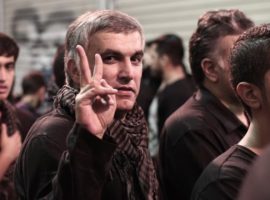On 8 October 2018, Nabeel Rajab was recognized as a shortlisted finalist for the Václav Havel Human Rights Prize. This prestigious prize is awarded each year by the Parliamentary Assembly of the Council of Europe, the Václav Havel Library, and the Charta 77 Foundation to honor outstanding civil society action in the defense of human rights. Rajab was one of three finalists in consideration for the prize. Nabeel Rajab’s shortlisting for the Václav Havel Human Rights Prize illustrates the magnitude of his impact on human rights despite government targeting and displays his dedication to human rights efforts in Bahrain at great personal cost.
Nabeel Rajab is a prominent human rights activist in Bahrain and is currently serving a total of seven years in prison on charges relating to free expression. In July 2017, Rajab was first sentenced to a two year term in prison for television interviews he gave, during which he called attention to the Bahraini government’s efforts to suppress free press. He was charged with “publishing and disseminating rumors and false news,” and while he appealed the decision twice, it was upheld both times.
Rajab was later sentenced to five additional years in prison on 21 February 2018. The new charges that led to his increased sentence included “spreading false rumors in time of war,” “insulting public authorities,” and “insulting a foreign country.” These unjust charges stemmed from comments published on his Twitter account calling attention to the torture of prisoners by the Bahraini government and criticizing the war in Yemen. On 5 June 2018, Bahrain’s High Court of Appeal ruled to uphold the five-year prison sentence.
The Bahraini government continues to target and harass Nabeel Rajab, and he could face further prison time for up to 14 other outstanding cases the government reportedly maintains against him. The details of these cases are unclear, but the authorities have already threatened to charge Rajab with additional counts of “spreading false news and statements and malicious rumors that undermine the prestige of the state” in relation to letters published in The New York Times and Le Monde. Additionally, on 12 September 2017, the government charged Rajab with “spreading false news,” “inciting hatred against the regime,” and “inciting non-compliance with the law” over social media posts published on his Twitter and Instagram accounts while he was already in police custody in January 2017. These cases could be sent to trial at any time.
In August 2018, the United Nations (UN) Working Group on Arbitrary Detention (WGAD) determined that his imprisonment is arbitrary, as it is in violation of several norms and laws of international human rights. The WGAD even noted that he should not have been subjected to a trial in the first place. The opinion from the Working Group additionally called for his immediate release and Rajab’s right to compensation and other reparations.
Nabeel Rajab’s steadfast efforts to underscore human rights abuses in Bahrain, even in the face of harsh reprisal by the authorities, have been and continue to be remarkable. He remains a prominent figure in the fight for fundamental freedoms in Bahrain, and his recognition serves not only to highlight his bravery and dedication, but also to shed light on the struggle of many prisoners of conscience still detained and imprisoned in Bahrain.
Rebecca Leussing is an Advocacy Intern with ADHRB.





